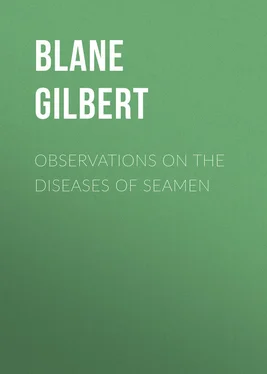Gilbert Blane - Observations on the Diseases of Seamen
Здесь есть возможность читать онлайн «Gilbert Blane - Observations on the Diseases of Seamen» — ознакомительный отрывок электронной книги совершенно бесплатно, а после прочтения отрывка купить полную версию. В некоторых случаях можно слушать аудио, скачать через торрент в формате fb2 и присутствует краткое содержание. Жанр: foreign_antique, foreign_prose, на английском языке. Описание произведения, (предисловие) а так же отзывы посетителей доступны на портале библиотеки ЛибКат.
- Название:Observations on the Diseases of Seamen
- Автор:
- Жанр:
- Год:неизвестен
- ISBN:нет данных
- Рейтинг книги:3 / 5. Голосов: 1
-
Избранное:Добавить в избранное
- Отзывы:
-
Ваша оценка:
- 60
- 1
- 2
- 3
- 4
- 5
Observations on the Diseases of Seamen: краткое содержание, описание и аннотация
Предлагаем к чтению аннотацию, описание, краткое содержание или предисловие (зависит от того, что написал сам автор книги «Observations on the Diseases of Seamen»). Если вы не нашли необходимую информацию о книге — напишите в комментариях, мы постараемся отыскать её.
Observations on the Diseases of Seamen — читать онлайн ознакомительный отрывок
Ниже представлен текст книги, разбитый по страницам. Система сохранения места последней прочитанной страницы, позволяет с удобством читать онлайн бесплатно книгу «Observations on the Diseases of Seamen», без необходимости каждый раз заново искать на чём Вы остановились. Поставьте закладку, и сможете в любой момент перейти на страницу, на которой закончили чтение.
Интервал:
Закладка:
There was only one in thirty of the sick sent to the hospital in the course of this month.
There was an increase both in the numbers and fatality of fevers. This increase was chiefly in that sort of fever which depends on the air and climate, the greater part of which was caught on the watering duty. There was a diminution of those fevers depending on infection, and the foul air of ships, which arose in the French prizes. The care that was taken in purifying these ships was very effectual; for only four died this month in the Ville de Paris, and fewer also were sent to the hospital than in May. The increase of the other kind of fever was chiefly owing to there being a greater number of ships in port, the crews of which were employed in watering, and partly, no doubt, to the increase of heat in the weather. The ships in which the fevers were most fatal were the Monarch, the Duke, the Torbay, and the Resolution. The sickness in the Duke was still in a great measure owing to the same infection that had hitherto prevailed; for this ship had never been cleared of the infectious fever, for want of room at the hospital. That which broke out in the Torbay was also of the low infectious kind, few of them having the symptoms of that which is peculiar to the climate, which prevailed in the other ships. This ship, though formerly very subject to infectious complaints, had been remarkably healthy for some time past; but it would appear that there was a large stock of latent infection, which shewed itself from time to time.
Some ships, particularly the Montague and Royal Oak, had no increase of fevers or other complaints, though the one lay in port for seven, and the other for eleven weeks, and were more or less exposed to the causes of sickness which affected the rest of the fleet. This is a proof, among many others, that a particular combination of causes is necessary to produce a disease: no single one, however powerful, being sufficient, without the concurrence of others. What seemed to be wanting here was the predisposition requisite for the admission of disease into the constitution; for the ships that enjoyed this happy exemption were such as had long-established and well-regulated crews, accustomed to the service and climate.
There had been this month a diminution both of the numbers and mortality of fluxes, which is agreeable to what was before remarked, that fevers were more apt than fluxes to prevail in the bad air of a harbour 16. It was also before remarked, that there were few or no fluxes in those ships in which the fever was most malignant; and now that the fever began to grow more mild in the French prizes, the flux began to appear. In the Barfleur, Duke, and Namur, both diseases seemed to prevail equally; but the fevers, though numerous, were more of the low nervous kind than bilious or malignant; and the fluxes chiefly attacked those who were recovering from fevers. We may farther remark, that these three men of war were three-decked ships, of 90 guns, the crews of which being more numerous, and composed of a more mixed set of men, were consequently subject to a greater chance of infection, and a greater variety of complaints. The Formidable still remained healthy to an extraordinary degree. Some fevers were indeed imported from the Ville de Paris by men that had been lent to that ship, and who were taken ill after their return. Of these, a few of the worst cases were sent to the hospital, and two died on board, who, with one that died the preceding month, make the whole mortality of this ship, since leaving England, amount only to the loss of three men.
There has been little or no increase of scurvy this month; for though the numbers put on the list appear to be greater, the mortality is much less. It may indeed appear a matter of surprise that there should have been any scurvy at all, considering that the greater part of the fleet was at anchor all this month. But as this was the greatest fleet that had ever visited Jamaica, it was impossible to find fresh provisions for the whole; and the small supply they had did not amount to one fresh meal in a week. Port Royal is also remote from the cultivated part of the island, so that fruit and vegetables were both scarce and high priced, particularly this year, on account of the usual rains in May and June having failed. There was, however, an allowance of fresh provisions and vegetables made to the sick by public bounty; for as the hospital could contain but a small proportion of the sick and wounded, an order was given for the supply of fresh meat, fruit, and vegetables, to the sick, and five hundred pounds of Peruvian bark were also distributed as a public gratuity, besides sugar, coffee, and wine.
With these aids, and the various good articles of victualling from England, the fleet was preserved uncommonly healthy for a West-India campaign: for though the mortality had increased considerably during our stay at Jamaica, yet the loss of men, upon the whole, was small, compared with that of other great fleets in this climate on former occasions. The greatest squadron, next to this, that had ever been on this station was that under Admiral Vernon in the year 1741, at the same season. From this fleet upwards of eleven thousand men were sent to the hospital in the course of that and the preceding year, of whom there died one in seven, besides what died on board of their own ships and in two hospital ships 17. The disproportion of sickness in the two fleets will appear still greater, when it is considered that Admiral Vernon’s contained only fifteen thousand seamen and marines 18; whereas that under Lord Rodney contained twenty-two thousand. What added to the sickness of the former was the unfortunate expedition to Carthagena in April, 1741; to which probably it was owing that a much greater proportion of yellow fevers were landed from the fleet at that time than from ours, as appears by the papers left by Mr. Hume, who was then surgeon of the hospital. The hospital was then at a place called Greenwich, on the side of the bay opposite to Port Royal, and was very large; but it was found to be in a situation so extremely unhealthy, that it was soon after abandoned and demolished, and the hospital has since been at Port Royal.
It appears by the tables, that a greater number was put on the list under the head of other complaints in this month than the last. This was owing to the great number of ulcers which I have remarked to keep pace with feverish as well as scorbutic complaints; for when the constitution of the air is favourable to disease, or the habit of body prone to it, wounds and sores are found then to be more difficult of cure. There were twelve deaths besides those occasioned by what have been called the three epidemics. Of these, five perished by drowning and other accidents, three died of ulcers, one of wounds received in action, one of cholera morbus , and one of an abscess.
It has appeared that very few ships of this numerous fleet preserved their health while lying at anchor; and it would seem that short and frequent cruises are very conducive to health. It was eleven weeks from the time that the first of our fleet came to anchor at Jamaica till the main body of it sailed for America on the 17th of July. Great fleets are in time of war under the necessity of being at one time longer at sea, and at another time longer in port, than is consistent with the health of the men, the ships being obliged to act in concert and to co-operate with each other. This is one reason, among others, for ships of the line being more sickly than frigates. As ships of war must be guided by the unavoidable exigencies of service, it would be absurd to consider health only; but if this were to be the sole object of attention, a certain salutary medium could be pointed out in dividing the time between cruising and being in harbour; and it is proper that this should be known, that regard may be had to it, as far as may be consistent with the service. I would say, then, that in a cold climate men ought not to be more than six weeks at sea at one time, and need not be less than five weeks, and that a fourth part of their time spent in port would be sufficient to replenish their bodies with wholesome juices. In a warm climate men may be at sea a considerable time longer, without contracting scurvy, provided they have been under a course of fresh and vegetable diet when in port.
Читать дальшеИнтервал:
Закладка:
Похожие книги на «Observations on the Diseases of Seamen»
Представляем Вашему вниманию похожие книги на «Observations on the Diseases of Seamen» списком для выбора. Мы отобрали схожую по названию и смыслу литературу в надежде предоставить читателям больше вариантов отыскать новые, интересные, ещё непрочитанные произведения.
Обсуждение, отзывы о книге «Observations on the Diseases of Seamen» и просто собственные мнения читателей. Оставьте ваши комментарии, напишите, что Вы думаете о произведении, его смысле или главных героях. Укажите что конкретно понравилось, а что нет, и почему Вы так считаете.












